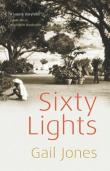AustLit
Latest Issues
AbstractHistoryArchive Description
'Sixty Lights is the captivating chronicle of Lucy Strange, an independent girl growing up in the Victorian world. From her childhood in Australia through to her adolescence in England and Bombay and finally to London, Lucy is fascinated by light and by the new photographic technology. Her perception of the world is passionate and moving, revealed in a series of frozen images captured in the camera of her mind's eye showing her feelings about love, life and loss. In this confident, finely woven and intricate novel Jones has created an unforgettable character in Lucy; visionary, gifted and exuberant, she touches the lives of all who know her.' (Publication summary)
Notes
-
Dedication: For my brothers, Peter and Kevin Jones.
Publication Details of Only Known VersionEarliest 2 Known Versions of
Other Formats
- Also braille and sound recording.
Works about this Work
-
Gail Jones' Novel Modernism : Sixty Lights and Literary Tradition
2022
single work
criticism
— Appears in: Inner and Outer Worlds : Gail Jones' Fiction 2022; -
Bioluminescence : Materiality, Metaphor and Trace in Sixty Lights
2022
single work
criticism
— Appears in: Inner and Outer Worlds : Gail Jones' Fiction 2022; -
A Metaphysical Meeting Place : Sixty Lights by Gail Jones
2021
single work
criticism
— Appears in: Reading Like an Australian Writer 2021; -
The Mobility of Identity : Home, Travel and Intercultural Fort\da in Gail Jones’s Sixty Lights
2021
single work
criticism
— Appears in: Contemporary Foreign Literature , no. 2 2021; (p. 144-150)'The Australian writer Gail Jones excels at "transnational writing" and Sixty Lights is one prominent example. The novel explores the themes of home, travel and "intercultural fort\da" by highlighting the fluidity of identity. Lucy changes her "home" frequently only to showcase the difference of her identity, and her three journeys across the ocean construct her identity within the sameness. Hence Lucy carries out the practice of "intercultural fort\da," pursuing "the contact zone," which exemplifies "contradictory subject positions," "relationality," and "situationality." In this neo-Victorian novel, Lucy’s identity transcends space and time, dispelling the contradictions and anxieties in the construction of her cultural identity. She finally becomes a unique "global traveller" and a "woman of the future."' (Publication abstract)
-
Camera, Colony, Künstlerroman : Photography in Three Australian Novels
2018
single work
criticism
— Appears in: Journal of Australian Studies , vol. 42 no. 1 2018; (p. 116-130)
-
Framed by Loss
2004
single work
review
— Appears in: The Weekend Australian , 14-15 August 2004; (p. 12)
— Review of Sixty Lights 2004 single work novel -
Humanity in Focus Through a Camera Lens
2004
single work
review
— Appears in: The Age , 21 August 2004; (p. 4)
— Review of Sixty Lights 2004 single work novel -
Artistic Light into the Future
2004
single work
review
— Appears in: The West Australian , 28 August 2004; (p. 7)
— Review of Sixty Lights 2004 single work novel -
Celluloid Path to Enlightenment
2004
single work
review
— Appears in: The Sydney Morning Herald , 4-5 September 2004; (p. 10)
— Review of Sixty Lights 2004 single work novel -
Strange Things
2004
single work
review
— Appears in: Australian Book Review , September no. 264 2004; (p. 45)
— Review of Sixty Lights 2004 single work novel -
Writing in Light: Insights in a Flash
2004
single work
biography
— Appears in: The Canberra Times , 21 August 2004; (p. 1a-2a) -
Reading Groups and Creative Writing Courses : The Year's Work in Fiction
2004
single work
review
— Appears in: Westerly , November vol. 49 no. 2004; (p. 164-175) -
Dark Downs Thriller Stands Tall on Short List
2005
single work
column
— Appears in: The Courier-Mail , 22 April 2005; (p. 3) -
Prize Fighters Booked for Crack at the Franklin
2005
single work
column
— Appears in: The Australian , 22 April 2005; (p. 3) -
Forgotten Novel Proves a Winner
2005
single work
column
— Appears in: The West Australian , 21 May 2005; (p. 6)
Awards
- 2006 longlisted International IMPAC Dublin Literary Award
- 2006 winner Festival Awards for Literature (SA) Adelaide Festival Awards for Literature South Australian Literary Awards — Premier's Award
- 2006 winner Festival Awards for Literature (SA) Adelaide Festival Awards for Literature South Australian Literary Awards — Award for Fiction
- 2005 shortlisted Victorian Premier's Literary Awards — Prize for Fiction
- 2005 winner The Age Book of the Year Award — Fiction Prize
- Ballarat, Ballarat area, Ballarat - Bendigo area, Victoria,
-
London,
cEngland,ccUnited Kingdom (UK),cWestern Europe, Europe,
-
cIndia,cSouth Asia, South and East Asia, Asia,
- 1800-1899







